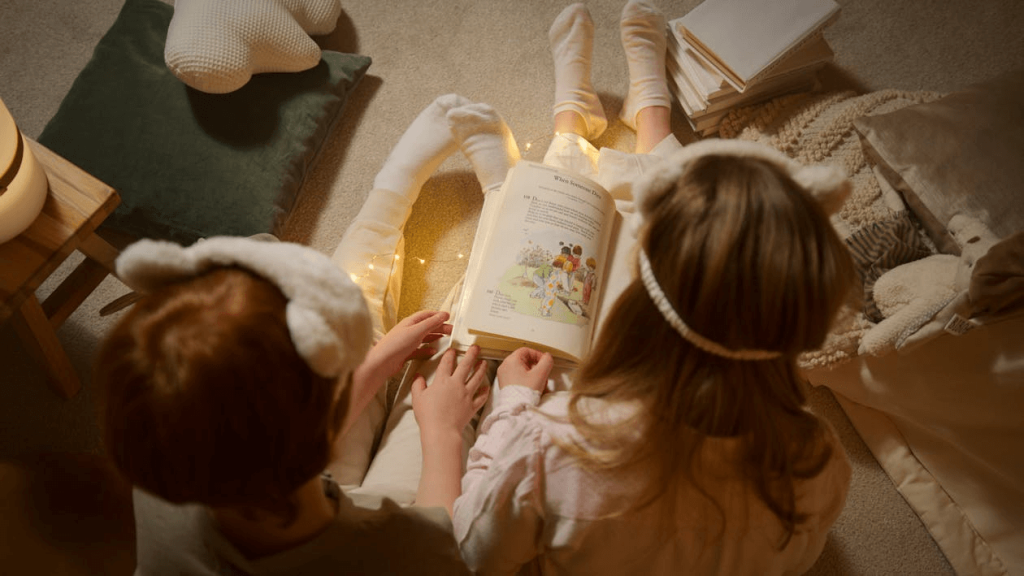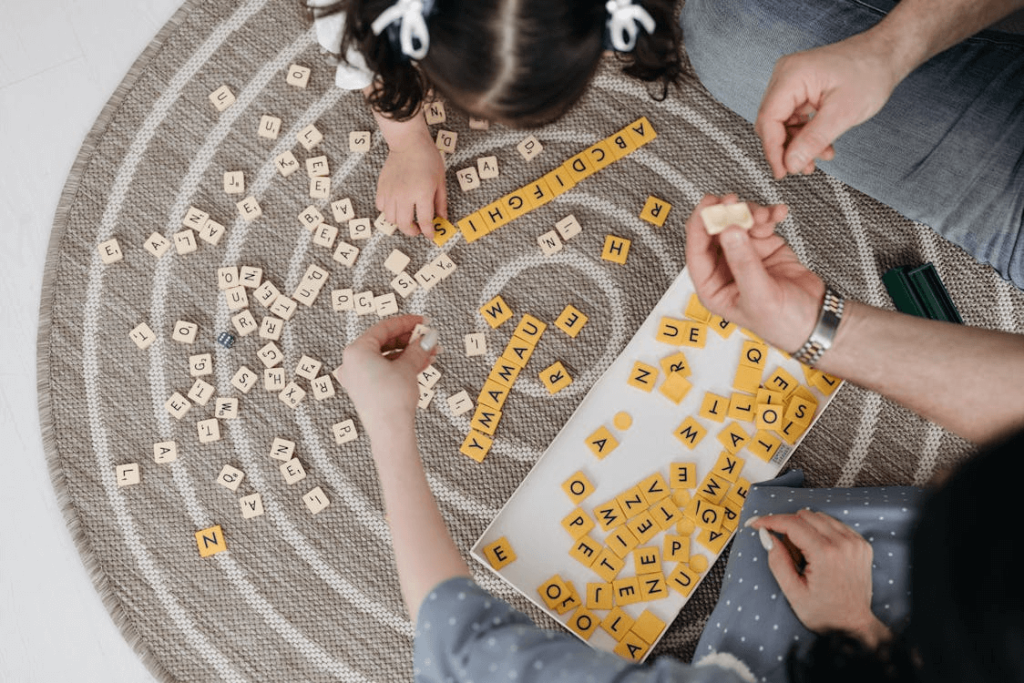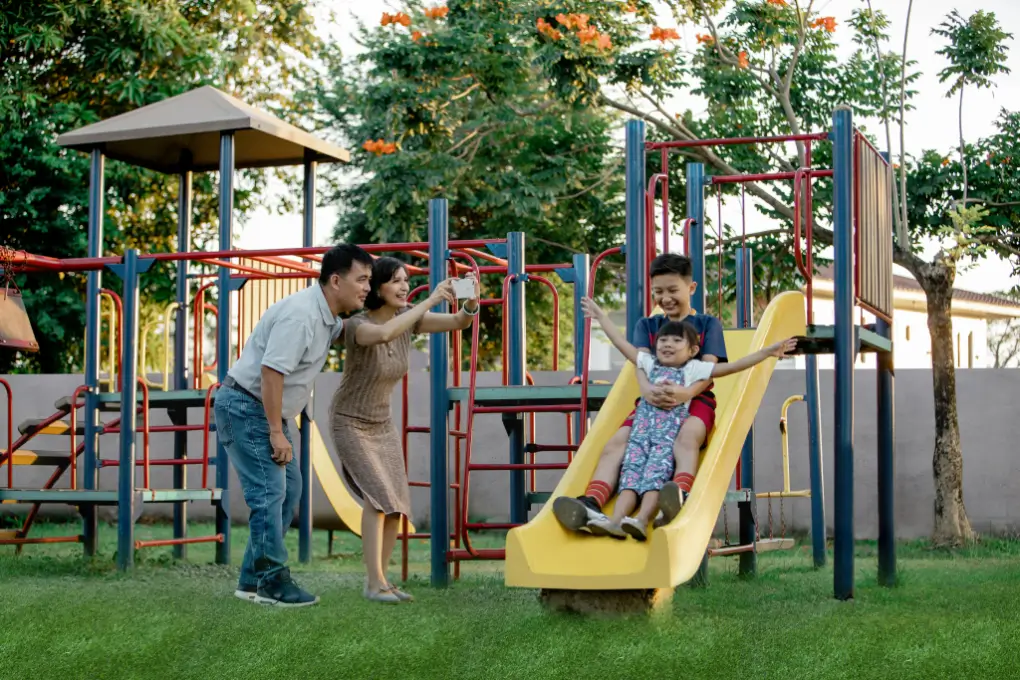Imagine your toddler pointing at a street sign while asking what the letters mean, or your child giggling as you read aloud their favorite bedtime story.
These simple moments are not only sweet, but they’re also the powerful building blocks of literacy.
While literacy is often viewed from an academic angle, it goes beyond schoolwork. Literacy is about equipping children with the skills, confidence, and curiosity that will enable them to understand the world beyond the classroom.
To teach kids literacy, you need to augment what they learn at school with activities at home. With the right environment, you can help your children develop language and literacy skills while making the process fun.

Photo by Artem Podrez: https://www.pexels.com/photo/girl-in-pink-long-sleeve-shirt-holding-white-book-7494500/
Why is a literacy-rich environment important?
Literacy is also more than just reading books. It is when you understand the language, express ideas, and build the confidence to think critically.
In turn, strong literacy skills foster your curiosity, creativity, and the ability to communicate effectively with others.
Children develop their literacy skills not only in school but also at home, where daily life offers countless learning opportunities. From early childhood, parents and families play an essential role in literacy development by making it fun and natural.
As parents, you don’t need complicated methods to support your child’s literacy learning. Simple things like integrating words, reading, and writing help children learn in a fun way.
For example, pointing out labels on objects or involving kids in writing shopping lists naturally exposes them to words that build their vocabulary.
Families who model literacy by reading aloud, writing notes, or sharing stories also show children how it connects to real life. When kids see adults read, write, and talk about ideas, they understand the value of literacy in their own lives.
How does digital access impact kids’ literacy?
Today, children’s exposure to literacy looks very different from that of previous generations. With social media, internet access, and even AI-powered tools becoming part of daily life, kids are surrounded by words, images, and stories in ways that previous generations never experienced.
While these digital platforms can spark curiosity and provide instant knowledge, they can also make it easy for children to consume information passively instead of truly engaging with it.
This is why creating a strong literacy-rich environment at home is more important than ever.
5 ways to promote literacy at home
At home is where you can make a big impact on your child’s literacy journey. By turning routines and play into literacy activities, parents can help their children develop skills while keeping them engaged. Here are a few ways to start:
Read aloud and converse with your kids
Reading aloud is one of the simplest yet most effective ways to promote your kids’ literacy. It introduces children to new vocabulary, builds background knowledge, and develops listening skills.
Asking the child questions like “What do you think happens next?” encourages critical thinking skills and makes their reading time interactive.
Daily conversations also matter. Talking to kids about everyday activities, like cooking dinner or visiting the park, supports their language development.
The more children hear and use words in conversations, the stronger their literacy foundation becomes.

Photo by RDNE Stock project: https://www.pexels.com/photo/woman-and-a-girl-wearing-pyjamas-sitting-on-a-bed-with-coffee-mugs-and-a-laptop-8489400/
Make use of the prints around you
Words are everywhere, and you can use this to your advantage. Label objects around the house, leave sticky notes with short messages, or invite children to help write shopping lists.
Even activities like pointing out street signs or reading birthday cards aloud become meaningful literacy activities.
Through these everyday activities, children learn that reading and writing are practical tools that connect to their daily lives.
Let your child write freely
Writing doesn’t always have to be essays and fully-formed narratives. Start simple—encourage writing with magnetic letters on the fridge, or let kids create their own stories in notebooks.
Even young, you can ask your child to scribble ideas or “sign” birthday cards, which helps them develop early literacy and writing confidence.
Illustrations and wordless books are another fun way to inspire creativity. Children can tell their own stories by describing what they see in the pictures, blending imagination with literacy learning.

Photo by Pavel Danilyuk: https://www.pexels.com/photo/high-angle-shot-of-family-playing-scrabble-8205377/
Play word games
Children learn best when literacy activities are playful. Play word games or sound games that encourage kids to connect sounds with words. For example, breaking down words like b-a-t helps them understand how letters and sounds fit together.
Pretend play also sparks literacy development. When kids act out stories, sing nursery rhymes, play games with made-up elements, or invent their own adventures, they practice language and storytelling skills.
Make reading more interesting
To make your children interested in reading, give them choices. Let them choose books that match their grade level reading, or explore wordless books if they’re still toddlers. Children are more likely to stay interested when they feel ownership over what they read.
Establishing a regular reading time before bed or during quiet afternoons also makes it a natural part of their days.
Over time, this consistency helps children become more literate and also learn to appreciate stories and the knowledge embedded in them.
How to establish a lasting literacy habit?
Building a literacy-rich environment at home is about consistency, encouragement, and modeling good habits. When children see these things as a normal part of their daily routine, they begin to view reading and writing as enjoyable, meaningful, and essential.
Be a role model
Parents play a key role by setting an example. Kids often imitate what they see, so when families read books, write notes, or enjoy conversations, children learn that literacy is valuable.
Even simple actions, like writing shopping lists together or reading aloud during family time, send a powerful message.
Build your child’s confidence
Every small success matters. When children learn new words, write their first stories, or recognize the same sound in different words, find ways to celebrate their progress.
Encouragement helps young children feel proud, builds confidence, and keeps them motivated to continue learning.
This positive reinforcement nurtures their literacy skills and the curiosity that will serve children throughout their lives.
Literacy begins at home
Creating a literacy-rich environment isn’t about perfection but making it a part of daily life in ways that are fun, natural, and meaningful.
By incorporating reading, writing, and conversations naturally into everyday activities, you can help your children grow into confident readers, writers, and thinkers who truly love books and stories.

Choose a nurturing home that’s ideal for learning
Discover more opportunities for your family in a home where you have the best opportunities for growth and development.
Explore Camella communities and their vast spaces where children can play, learn, and thrive.

Celebrate Life’s Milestones in Camella!
Make unforgettable memories in a Camella home.
Our communities are designed to elevate your living experience.


